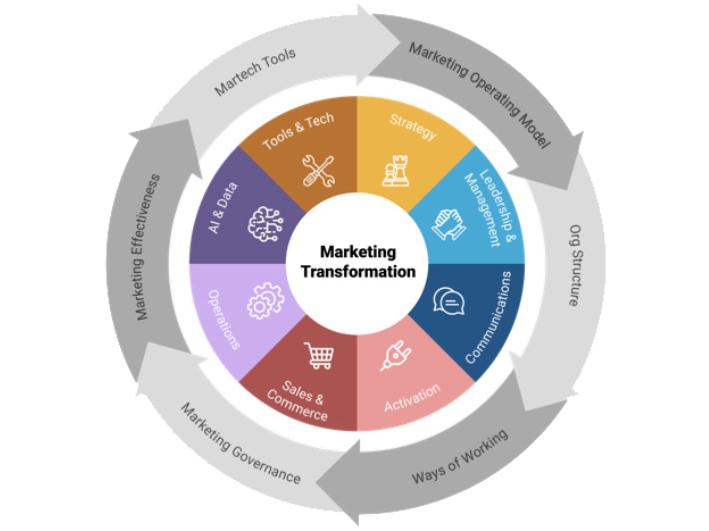Marketing Capabilities has become increasingly important for organisations, as they look to drive sustainable growth, and adapt to changing customer expectations.
Let's begin by explaining what we mean by the term:
Marketing capabilities refers to the combination of skills, knowledge, processes, tools, ways of working, and practices that a marketing team needs to deliver effective marketing and drive overall business performance in a digital age.
A capability is how the team provides value to the business as a whole. It may be the combination of the skills, knowledge and effective execution by team members. For example, an effective email marketing strategy requires a range of skills - copywriting, design, segmentation, personalisation - and the tools to put it into practice.
These capabilities are critical for understanding and engaging with customers through digital channels, analysis of market data, and adapting marketing strategies in real-time.
They encompass a range of competencies, including digital literacy, data analytics, customer insights, content creation, and strategic planning, all essential for thriving in the rapidly evolving digital marketplace.
Capabilities, competencies, and enablement
It's important to distinguish between competencies and capabilities. Competencies refer to the individual ability - skills and knowledge, and talent - required to carry out a task, while capabilities are the collection of competencies that organisations can draw upon, and which can impact business outcomes.
Companies may have the competencies in place, in the form of talented and knowledgeable teams, but they must still ensure they have the right operations and enablement practices in place, such as agile ways of working, effective governance, the right tech and tools, and clearly defined and understood strategic vision.
Maintaining and improving the marketing capabilities of an organisation is all about blending these three elements - ensuring that the competencies are in place and that enablers exist to ensure that they improve the overall marketing capability.

Marketing Capabilities can be associated with digital transformation, and programs are often undertaken as part of transformation projects.
Marketing capabilities programs are also key to ensuring that marketing teams are able to deliver effective data-driven marketing which contributes towards overall business goals.
The common theme in both digital transformation and marketing transformation is the need to adapt existing technology, structures, and ways of working to meet changing customer needs.
What is driving the need for marketing capabilities?
There are several factors driving the need for businesses to focus on marketing capabilities, and the creation of key roles to drive these goals.
- Rapid technological change. As well as the explosion in consumer tech, marketing technology has grown rapidly over the past decade. Marketers now require a range of tech tools to reach customers.
- Changing customer expectations. Tech giants such as Amazon, Netflix, and Apple have raised the bar for customer experience.
- New channels. The proliferation of digital channels has significantly increased the complexity and diversity of options available to marketers, and the skills and knowledge needed to market to these channels, and integrate them into wider marketing strategy.
- Proliferation of data. Marketers now have more data than ever, which brings opportunities to learn more about customers, but also creates challenges which require greater skills and knowledge.
- The need to adapt to thrive. Technology changes rapidly, and organisations need to be able to keep on top of new trends and ensure that they have the capabilities to adapt. Right now, for example, organisations are figuring out how to use AI to their advantage.
For these reasons, the following are some of the most in-demand marketing capabilities:
- AI Marketing
- Martech & Marketing Operations
- Sales Enablement & Operations
- Data
- Growth Marketing
- Digital Commerce
How can organisations improve marketing capabilities?
Many organisations have been running marketing capabilities programs, delivered through marketing academies.
This requires a structured approach that involves assessment, planning, implementation, and continuous improvement.
Programs and academies, delivered by marketing capabilities leaders, should be closely aligned with the CMO’s vision and operating model, which itself takes the lead from the overall business objectives.
This structured approach to planning enables gaps in capabilities to be identified accurately and programs to be designed around the marketing team’s training needs, targets, and ways of working.
The outcome should be the encouragement of a culture that places value on continuous learning, adaptability, and customer-centricity, and ensures that organisations are well-placed to meet current and future challenges.
In this way, the development of robust marketing capabilities is essential not only for achieving immediate marketing objectives but also for driving long-term business growth and success.
This a process we explore in detail in our new report: 'Marketing Capabilities Excellence: Developing Your Marketing Capability Program & Academy'.
